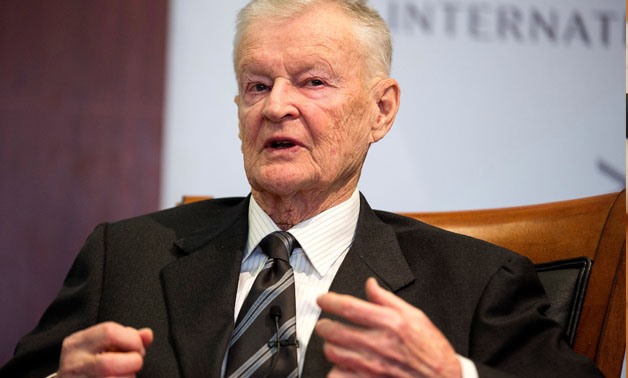
Former U.S. National Security Advisor, Zbigniew Brzezinski, speaks at a forum hosted by the Center for Strategic and International Studies in Washington, March 9, 2015. REUTERS/Joshua Roberts/File Photo
Washington - 27 May 2017: Zbigniew Brzezinski, the hawkish Polish-born Cold War strategist and former top aide to US president Jimmy Carter who influenced key policy decisions on Afghanistan, China and the Middle East, has died, his family said. He was 89.
His death in a Virginia hospital was announced late Friday by his daughter, Mika Brzezinski, an MSNBC journalist. She said he died "peacefully" but did not give a cause.
Former president Barack Obama called Brzezinski "a powerful intellect and a passionate advocate for American leadership," adding in a statement that "his ideas and advocacy helped shape decades of American national security policy."
In his own statement, Carter paid tribute to someone who "was an important part of our lives for more than four decades and was a superb public servant."
The Polish-born Brzezinski became Carter's national security adviser at a time of exceptional international turmoil that included the Soviet invasion of Afghanistan and the Iranian hostage crisis.
He was a driving force behind the failed US commando mission to rescue the hostages, after which he resigned. He believed Soviet influence would sweep through Iran if US strength did not prevail in the drama.
Nominally a Democrat, he leaned conservative on security matters. A tough critic of the Soviet Union, he also helped broker the Camp David accords and worked on normalizing relations with China.
But some critics say he helped spawn al-Qaeda by working through the CIA to arm and support anti-Soviet jihadists in Afghanistan.
Though a rigorous anti-communist, he held that US interests around the world should be addressed in terms of strategy and practicality, not ideology.
Born in Warsaw to a diplomat father, Brzezinski moved with his family to Canada in the late 1930s. He attended McGill University in Montreal then earned a doctorate from Harvard, later becoming a US citizen.
He served under president Lyndon Johnson before becoming Carter's national security adviser.
He had developed his ties to Carter on the Trilateral Commission, the group created by the banker David Rockefeller in 1973 as a forum for political and business leaders from North America, Western Europe and Japan. Brzezinski was the commission's first director.
Brzezinski, an active professor and author well into his 80s, did not support President Donald Trump's election and criticized his foreign policy as vague.
"Does America have a foreign policy right now?" he tweeted in February.
"The President should outline why America is important to the world, but also why the world needs America."
In 2011, he penned "Strategic Vision: America and the Crisis of Global Power," arguing that US strength abroad was key to global stability.
But it would depend on America's ability to foster "social consensus and democratic stability" at home, he said, referring to the need for less income inequality and a meaningful response to climate change.
An array of politicians and commentators at home and abroad expressed their respect for Brzezinski.
The conservative author and military historian Max Boot tweeted: "I didn't always agree with him, but #Brzezinski was a foreign policy giant who confronted Soviet aggression & helped win the Cold War. RIP."
Brzezinski was an outspoken supporter of the Solidarity movement in Poland led by Lech Walesa, once calling it "the beginning of a political tsunami that swept away the Soviet bloc, then the Soviet Union itself." Tributes in his native land were effusive.
"The world has lost an outstanding intellectual, an experienced and effective diplomat, as well as an honorable man and a proud Pole," Polish Foreign Minister Witold Waszczykowski said in a statement. "He never forgot about the country of his origin.
"Through his tough stance against the Soviet Union, Brzezinski played a key role in the process of the collapse of the totalitarian communist system, which had been imposed upon the countries of Central and Eastern Europe after World War II," Waszczykowski added.
Writing on Twitter, Polish President Andrzej Duda also paid tribute.
"Zbigniew Brzezinski is gone. He was once the voice of Poland in the White House. A free Poland. Because he tirelessly strove for our freedom. Thank you!"
In a tribute on Instagram, Mika Brzezinski wrote: "He was known to his friends as Zbig, to his grandchildren as Chief and to his wife as the enduring love of her life.
"I just knew him as the most inspiring, loving and devoted father any girl could ever have."


Comments
Leave a Comment